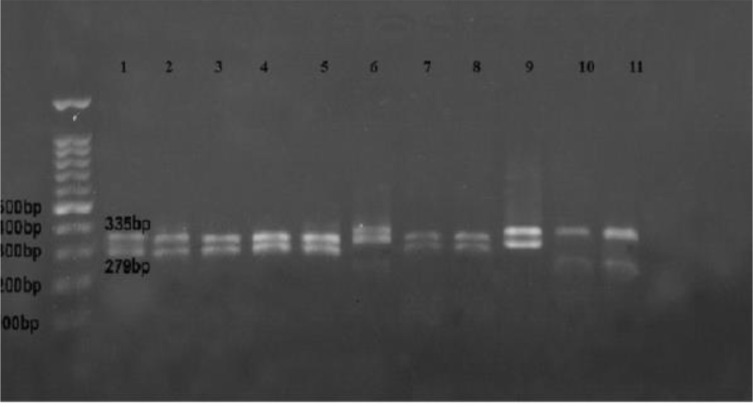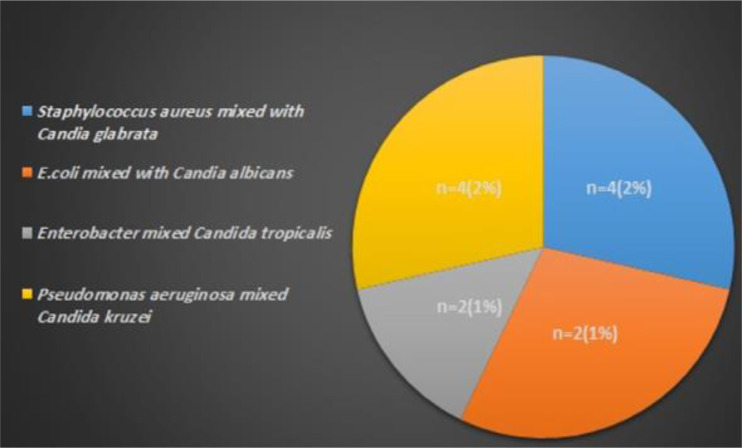心内直视手术后胸骨浅、深创面真菌和细菌合并感染。
IF 1.3
Q4 MICROBIOLOGY
引用次数: 0
摘要
背景和目的:胸骨感染增加了患者的住院时间,从而增加了治疗费用。由于胸骨感染增加了患者的住院时间,从而增加了治疗费用,本研究旨在评估心脏直视手术后胸骨浅创面和深部创面的真菌和细菌合并感染及其与危险因素的关系。材料与方法:于2018年3月21日至2019年3月20日期间,采用问卷调查和两份拭子取样的方式收集数据,并送往实验室进行伤口感染有效微生物的诊断。采用纸片扩散法对氟康唑及特异性抗生素进行药敏试验。结果:210例患者中,2%的患者有深胸骨伤口感染。胸骨伤口真菌和细菌共感染最常见的是金黄色葡萄球菌合并光秃念珠菌4%,大肠杆菌合并白色念珠菌2%。金黄色葡萄球菌和大肠杆菌对环丙沙星、诺氟沙星、美罗培南和亚胺培南的敏感性最高。光秃念珠菌和白色念珠菌对氟康唑的耐药率最高。结论:根据本研究结果,入住CCU第7天和第28天的患者胸骨创面真菌合并细菌感染的风险较高。因此,及时和适当的抗生素治疗,包括使用适当的抗生素,可能是患者康复的重要一步。本文章由计算机程序翻译,如有差异,请以英文原文为准。



Fungal and bacterial co-infection in the superficial and deep sternal wound after open cardiac surgery.
Background and Objectives: Sternum infection increases the time of the patients stay in the hospital and, as a result, increases the treatment costs. This study aimed to evaluate the fungal and bacterial co-infection in the superficial and deep sternal wounds after open cardiac surgery and its relationship with risk factors, as sternal infection increases the time of the patient's stay in the hospital and, as a result, increases the treatment costs. Materials and Methods: Data were collected using a questionnaire and sampling with two swabs after open heart surgery and hospitalization from 21 March 2018 to 20 March 2019 and sent to the laboratory for diagnosis of microorganisms effective in wound infection. Susceptibility testing for fluconazole and specific antibiotics was performed by the disk diffusion method. Results: Out of 210 patients studied, 2% of patients had deep sternal wound infections. The most common coinfection fungal and bacterial agents in sternal wounds were caused by Staphylococcus aureus with Candida glabrata 4% and Escherichia coli with Candida albicans 2%. S. aureus and E. coli showed the highest antibiotic susceptibility to the antibiotics ciprofloxacin, norfloxacin, meropenem, and imipenem. Candida glabrata and Candida albicans had the highest rate of resistance to fluconazole. Conclusion: According to the results of this study, patients on the 7th day in the cardiac care unit (CCU) and the 28th day are at higher risk of getting confection of fungi with bacteria in the sternal wound. Therefore, timely and appropriate antibiotic therapy, including the use of appropriate antibiotics, can be an important step in the patient's recovery.
求助全文
通过发布文献求助,成功后即可免费获取论文全文。
去求助
来源期刊

Iranian Journal of Microbiology
MICROBIOLOGY-
CiteScore
2.40
自引率
7.10%
发文量
96
审稿时长
12 weeks
期刊介绍:
The Iranian Journal of Microbiology (IJM) is an international, multi-disciplinary, peer-reviewed journal that provides rapid publication of the most advanced scientific research in the areas of basic and applied research on bacteria and other micro-organisms, including bacteria, viruses, yeasts, fungi, microalgae, and protozoa concerning the development of tools for diagnosis and disease control, epidemiology, antimicrobial agents, clinical microbiology, immunology, Genetics, Genomics and Molecular Biology. Contributions may be in the form of original research papers, review articles, short communications, case reports, technical reports, and letters to the Editor. Research findings must be novel and the original data must be available for review by the Editors, if necessary. Studies that are preliminary, of weak originality or merely descriptive as well as negative results are not appropriate for the journal. Papers considered for publication must be unpublished work (except in an abstract form) that is not under consideration for publication anywhere else, and all co-authors should have agreed to the submission. Manuscripts should be written in English.
 求助内容:
求助内容: 应助结果提醒方式:
应助结果提醒方式:


